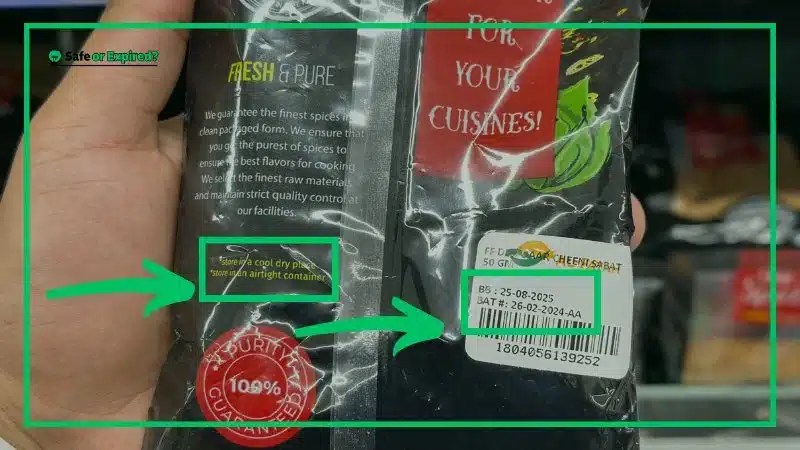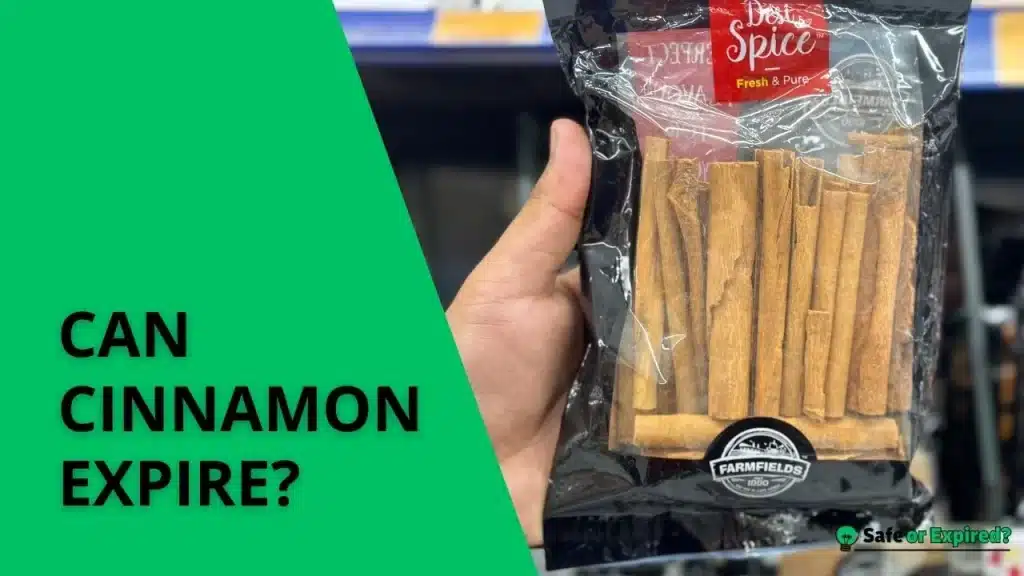“Can cinnamon expire?” is a common question among baking enthusiasts and spice lovers alike! It does go bad, and knowing what to do afterward is crucial if you want to stay healthy. In this post, we’ll dive into how cinnamon changes over time and offer fun tips on making the most of your spice.
Let’s start!
Can Cinnamon Expire?
Yes, cinnamon can expire in terms of losing its flavor and aroma, which are essential for its use in cooking and baking. While it does not spoil like perishable food, its quality degrades over time, making it less effective as a spice.
So, how long can cinnamon expire? Cinnamon’s potency begins to diminish after about two years for ground varieties and three years for cinnamon sticks. However, it remains safe to use beyond these periods, just with lessened flavor. You can check the packaging to know about the expiry date.

Are you wondering, “Can cinnamon expire in fridge?” Storing cinnamon in the fridge is not recommended, as the fluctuating temperatures and moisture can actually accelerate the loss of its aromatic compounds. Room temperature storage in a dry, dark place is ideal.
People often ask, “What is cinnamon shelf life after opening?” Once opened, cinnamon’s shelf life remains similar to its unopened state—about two years for ground cinnamon and three years for sticks. To maximize freshness, keep it in an airtight container.
Here are all the factors that impact the shelf life of cinnamon:
- Storage Conditions: Cinnamon lasts longer when stored in a cool, dry place away from sunlight. Exposure to heat, light, and moisture speeds up the degradation of its flavor and aroma.
- Container Type: An airtight container is crucial for maintaining the quality of cinnamon by preventing exposure to air and humidity, which are spoilage factors.
- Form of Cinnamon: Cinnamon sticks tend to last longer than ground cinnamon because they have a lower surface area exposed to air, which helps retain their essential oils and flavor for a longer period.
- Environmental Factors: Environmental factors like temperature fluctuations and high humidity can adversely affect the quality of cinnamon, speeding up the loss of its aromatic and flavorful properties.
By understanding and controlling these factors, you can help ensure that your cinnamon retains its best qualities for as long as possible.
Here’s a completed table to outline the typical shelf life of cinnamon under different storage conditions:
| Storage Location | Opened Cinnamon | Un-Opened Cinnamon |
| Counter | 3 years | 4 years |
| Fridge | Not recommended | Not recommended |
How Long Does Cinnamon Last After Expiration Date?
Cinnamon can last indefinitely beyond its expiration date, but its quality will degrade over time. Typically, ground cinnamon maintains its best quality for about three years, while cinnamon sticks can last up to four years if stored properly.
After these periods, cinnamon is still safe to use but may not impart as much flavor to your recipes.
Do Cinnamon Sticks Expire?
Cinnamon sticks do not expire in the traditional sense, where they become unsafe to consume. However, over time, they do lose their potency and aroma. Properly stored cinnamon sticks can maintain their best quality for up to four years.
Beyond that, while still safe to use, they will not provide as strong a flavor as fresh cinnamon sticks.
Can Expired Cinnamon Make You Sick? Yes or No?
No, expired cinnamon will not make you sick. It loses flavor and potency over time but remains safe to consume even after its best-before date. Note that cinnamon is a dry spice that does not harbor bacteria or mold when it ages.
The essential oils that give cinnamon its aroma and taste gradually diminish, but this does not make the spice harmful. So, although safe, expired cinnamon may not provide the desired strength or flavor in recipes. The fading of aromatic compounds means it won’t enhance your dishes as effectively as fresh cinnamon would.
What Happens if You Eat Expired Cinnamon
Eating expired cinnamon typically isn’t harmful as spices lose potency over time rather than becoming dangerous. You might notice a weaker flavor and aroma, but it’s unlikely to cause illness. However, if it shows signs of spoilage, like mold or an unusual odor, it’s best to discard it to avoid potential health risks.
No Health Implications
Consuming expired cinnamon is not harmful because cinnamon is a dry spice that does not spoil like perishable foods. It does not support microbial growth that could lead to foodborne illnesses. Thus, expired cinnamon is safe to consume from a health standpoint.
Impact on Culinary Quality
The primary concern with using expired cinnamon is its reduced effectiveness in enhancing the flavors of dishes. As cinnamon ages, the volatile compounds responsible for its distinctive smell and taste gradually evaporate. This means that while the spice won’t harm you, it may not fulfill its role in your recipes, potentially leading to bland dishes.
Recommendations for Consumers
For those who frequently use cinnamon for its flavor and health benefits, it’s advisable to purchase smaller quantities to ensure it’s used while still potent. Store it properly in airtight containers. Put these containers away from light and heat if you want to extend the shelf life.
If your cinnamon has lost its aroma and taste, consider replacing it for cooking purposes. However, don’t discard it! Expired cinnamon can still be used for household fragrances or as a mild abrasive cleaner in DIY cleaning solutions. This way, you can repurpose it and reduce waste.
How to Know Cinnamon Has Gone Bad? Look for These Signs
Cinnamon has gone bad when it loses its characteristic smell and taste. If the cinnamon smells musty or has no aroma, and the flavor is weak, it’s an indicator that it has lost its potency and is past its prime.
Loss of Aroma
The most immediate indicator of cinnamon that has gone bad is a noticeable lack of scent. Fresh cinnamon should emit a distinct, warm, spicy aroma. If your cinnamon does not smell or the scent is significantly weaker, it’s a sign that the essential oils have evaporated and the spice has lost its potency.
Change in Taste
Another clear sign is the flavor. If the cinnamon tastes stale, lacks its characteristic spicy sweetness, or is barely noticeable when added to dishes, it has likely degraded. Fresh cinnamon should be vibrant and aromatic when tasted.
Visual Changes
Inspect the cinnamon for any visual changes. Ground cinnamon that shows signs of clumping or moisture has possibly been exposed to water and might be prone to mold. Cinnamon sticks that have mold growth or discoloration should also be discarded. These changes can compromise the quality and safety of the spice.
Here’s a picture of top-quality cinnamon stick.

By regularly checking all of these aspects, you can ensure that your cinnamon is fresh and effective for cooking and baking, enhancing your recipes with its full, intended flavor profile.
It’s also important to understand why food spoils to prevent it effectively. Learn more in “What Causes Food to Spoil? 13 Reasons.“
What To Do With Expired Cinnamon Powder?
Expired cinnamon powder, while less potent for culinary uses, can still be repurposed around the house. Use it as a natural air freshener or a gentle abrasive for cleaning, or incorporate it into homemade crafts and potpourri. From freshening up your living spaces to crafting, expired cinnamon can still be a handy household ingredient.
Freshen Up Your Home
Sprinkle some expired cinnamon powder into your vacuum cleaner bag or directly on carpets before vacuuming. The natural aroma of cinnamon will release as you clean. This will leave your home smelling fresh and cozy.
Natural Cleaning Agent
Create a non-toxic scrub by mixing expired cinnamon powder with just a bit of water. Use this paste to gently clean kitchen surfaces and stainless steel appliances. It’s effective at scrubbing away stains and smells great too!
Crafting with Cinnamon
Expired cinnamon can be a great addition to homemade potpourri or craft projects. Mix it with dried flowers, citrus peels, and a few drops of essential oil to make a delightful, natural potpourri. Place it in bowls around your home for a continuous fragrant touch.
Using expired cinnamon in these ways not only saves money but also promotes a more sustainable lifestyle by reducing waste. So next time you find that old jar of cinnamon, think twice before discarding it!
Common Myths and Misconceptions About Cinnamon Expiry
There are several myths about cinnamon expiry, such as it can spoil like perishable food or become harmful after its best-before date. In reality, cinnamon simply loses its potency over time but remains safe to use indefinitely if stored properly.
Myth: Cinnamon Spoils Like Perishable Food
Unlike perishable items that can grow harmful bacteria, cinnamon does not spoil due to its low moisture content. It remains safe to consume well past its expiration date, though its flavor may diminish.
Myth: Expired Cinnamon Becomes Harmful
Another common misconception is that cinnamon becomes toxic once it’s past the expiration date. This is not true; cinnamon’s primary change over time is a reduction in flavor and aroma, not a transformation into a harmful substance.
Myth: Cinnamon Loses All Usefulness After Expiry
Even though expired cinnamon loses some of its punch in culinary uses, it can still serve various purposes around the house, such as in crafts or as a natural deodorizer.
By understanding these facts, you can better manage your cinnamon supply and use it effectively, ensuring nothing goes to waste.
There’s a lot more incorrect information out there about how to preserve food. Clear up any confusion with “Debunking Common Food Preservation Myths.”
FAQs
Is It OK to Use Expired Ground Cinnamon?
Yes, it is okay to use expired ground cinnamon. While it may lose some of its potency and flavor over time, expired ground cinnamon remains safe to consume. Its primary change is a reduction in the intensity of its aroma and taste, but it does not become harmful or spoil.
Does Cinnamon Expire After a Year?
Cinnamon does not expire in the sense that it becomes unsafe to use after a year. However, ground cinnamon typically begins to lose its flavor after about two to three years. Cinnamon sticks, on the other hand, can retain their potency for up to four years. Proper storage in a dry place can help extend its flavorful lifespan.
Can Expired Cinnamon Rolls Make You Sick?
Expired cinnamon rolls, unlike the cinnamon spice itself, can make you sick if the dough or other ingredients have spoiled. While the cinnamon in the rolls doesn’t pose a health risk, other components like eggs, butter, and milk can spoil and become unsafe to eat. Always check for spoilage, such as an off smell or visible mold, before consuming baked goods past their expiration date.
Conclusion
In summary:
- Cinnamon doesn’t spoil but loses potency: Cinnamon remains safe to use indefinitely but may lose its strong flavor and aroma over time.
- Proper storage extends shelf life: Keeping cinnamon in a dry spot away from sunlight helps maintain its quality.
- Creative uses for old cinnamon: Even if it’s past its prime, you can use cinnamon for household fragrances or as a natural cleaning agent.
We’ve explored the enduring nature of cinnamon and how you can still utilize it beyond its peak. Embrace these insights to spice up your culinary and household routines in unexpected ways!

